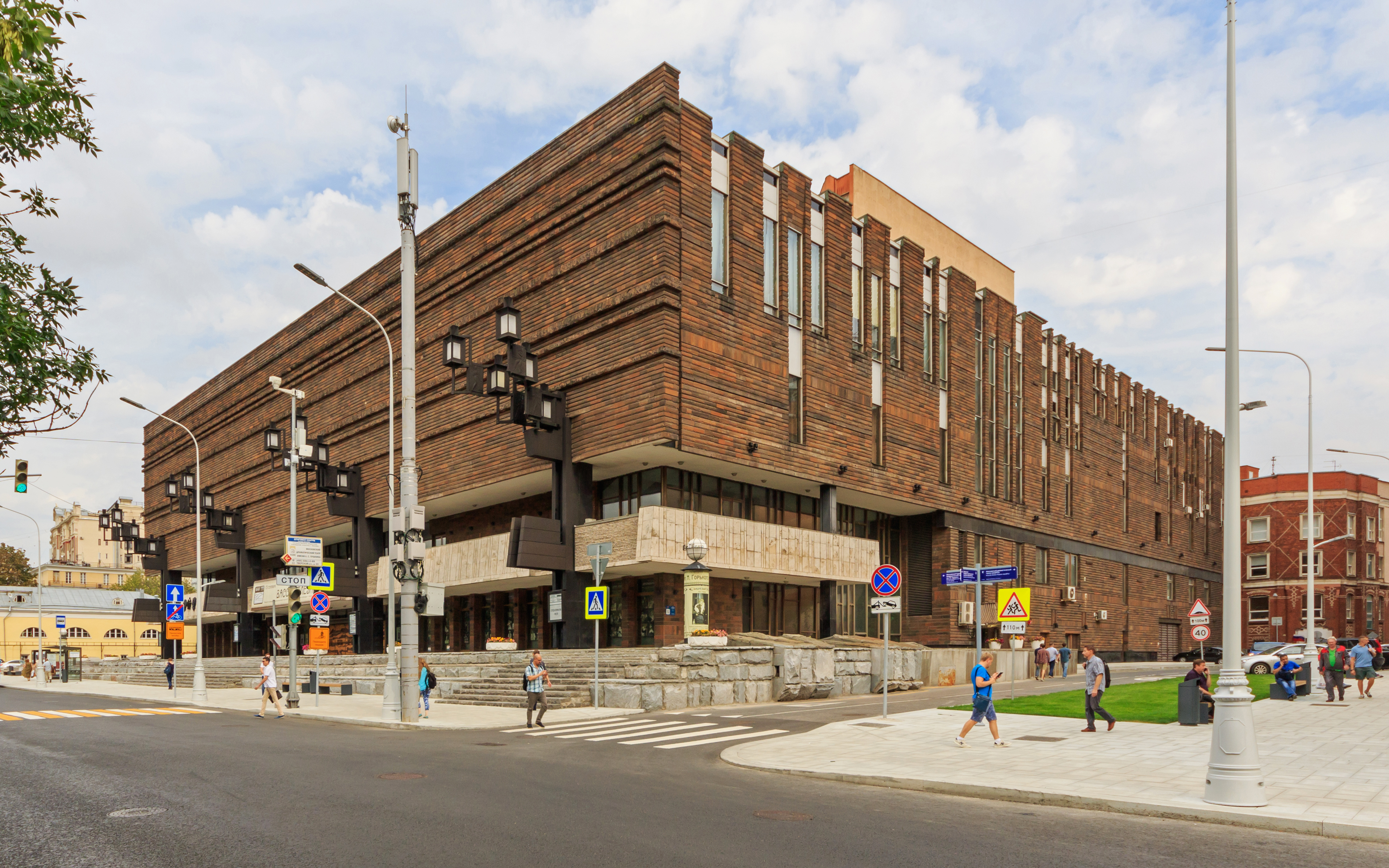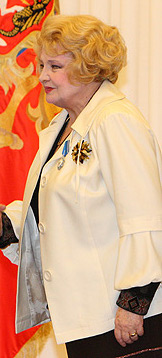|
Moscow Chekhov Art Theatre
Moscow Chekhov Art Theatre () is a drama theatre in Moscow founded in 1987 after the division of the Gorky Moscow Art Theatre into two theatres. Since 1989, it has been named after Anton Pavlovich Chekhov, one of its main authors. In 2004, it returned to its historical name, "Moscow Art Theatre", abandoning the title "academic". Its artistic director is Konstantin Khabensky, People's Artist of the Russian Federation(since October 28, 2021). History Theatre under Oleg Efremov (1987-2000) The Moscow Art Theatre of the USSR was created in 1987 after the signing of Order No. 383 by the Minister of Culture of the Soviet Union, Vasily Zakharov. According to this document, the theatre was officially divided into two: the Moscow Gorky Academic Art Theatre on Tverskoy Boulevard under the direction of Tatiana Doronina and the Chekhov Art Theatre (for two years after the division, it also bore the name of Gorky) on Kamergersky Lane. The theatre director, People's Artist of the USSR, Ole ... [...More Info...] [...Related Items...] OR: [Wikipedia] [Google] [Baidu] |
Moscow
Moscow is the Capital city, capital and List of cities and towns in Russia by population, largest city of Russia, standing on the Moskva (river), Moskva River in Central Russia. It has a population estimated at over 13 million residents within the city limits, over 19.1 million residents in the urban area, and over 21.5 million residents in Moscow metropolitan area, its metropolitan area. The city covers an area of , while the urban area covers , and the metropolitan area covers over . Moscow is among the world's List of largest cities, largest cities, being the List of European cities by population within city limits, most populous city entirely in Europe, the largest List of urban areas in Europe, urban and List of metropolitan areas in Europe, metropolitan area in Europe, and the largest city by land area on the European continent. First documented in 1147, Moscow became the capital of the Grand Principality of Moscow, which led the unification of the Russian lan ... [...More Info...] [...Related Items...] OR: [Wikipedia] [Google] [Baidu] |
Fyodor Schechtel
Fyodor Osipovich Schechtel (; – July 7, 1926) was a Russian architect, graphic artist and stage designer, the most influential and prolific master of Russian Art Nouveau and late Russian Revival architecture. Baptised as Franz Albert Schechtel (also transliterated as Shekhtel), he created most of his work as Franz Schechtel (Франц Шехтель), changing his name to Fyodor with the outbreak of World War I. In two decades of independent practice he completed five theaters, five churches, 39 private residences, Yaroslavsky Rail Terminal and various other buildings, primarily in Moscow. Most of his legacy survives to date. Biography Early life Franz Schechtel (Russified as Fyodor Osipovich) was born to a family of ethnic German engineers in Saint Petersburg, the second of five children. His parents were Volga Germans of Saratov. His mother, born Daria Karlovna Zhegin, came from a family of Saratov merchants. Schechtel's uncle on his father's side, also named Franz Schec ... [...More Info...] [...Related Items...] OR: [Wikipedia] [Google] [Baidu] |
Moscow Art Theatre
The Moscow Art Theatre (or MAT; , ''Moskovskiy Hudojestvenny Akademicheskiy Teatr'' (МHАТ) was a theatre company in Moscow. It was founded in by the seminal Russian theatre practitioner Konstantin Stanislavski, together with the playwright and director Vladimir Nemirovich-Danchenko. It was conceived as a venue for Naturalism (theatre), naturalistic theatre, in contrast to the melodramas that were Russia's dominant form of theatre at the time. The theatre, the first to regularly put on shows implementing Stanislavski's system, proved hugely influential in the acting world and in the development of modern American theatre and drama. It was officially renamed the Gorky Moscow Art Theatre in 1932. In 1987, the theatre split into two theatre company, troupes, the Moscow Gorky Academic Art Theatre and the Moscow Chekhov Art Theatre. Beginnings At the end of the 19th-century, Stanislavski and Nemirovich-Danchenko both wanted to reform Russian theatre to high-quality art that was a ... [...More Info...] [...Related Items...] OR: [Wikipedia] [Google] [Baidu] |
Konstantin Khabensky
Konstantin Yurievich Khabensky, People's Artist of Russia, PAR (; born 11 January 1972) is a Russian actor of stage and film, director and philanthropist. From 1997 he was part of the Saint Petersburg Lensoviet Theatre cast until 2000, after which he transferred to the Moscow Art Theatre in 2002 where he is still active. Khabensky's first lead roles in cinema were in ''Women's Property'' (1999) and in the film ''In Motion (film), In Motion'' (2002). Among the Russian audience he gained recognition with the TV series ''Deadly Force (TV Series), Deadly Force'' (2002-2005), while his international breakthrough came with the films ''Night Watch (2004 film), Night Watch'' (2004) and ''Day Watch (film), Day Watch'' (2006) as the protagonist, Anton Gorodetsky. Other notable films with him in the lead role include ''Poor Relatives'' (2005), ''The Irony of Fate 2'' (2007), ''Collector (2016 film), Collector'' (2016), TV series ''Pyotr Leschenko. Everything That Was...'' (2013), ''The Meth ... [...More Info...] [...Related Items...] OR: [Wikipedia] [Google] [Baidu] |
People's Artist Of The Russian Federation
People's Artist of the Russian Federation ()is an honorary title given no earlier than five years after the honorary title "Honored Artist of Russia" or " Honored Art Worker of Russia" to an important artist who has created extraordinary works of painting, sculpture, graphic art, monumental, decorative, crafts, music, drama, film, or television; who has made an outstanding contribution to domestic art and culture; and who has received wide public recognition. This title in succession continues the Soviet tradition: a similar level of recognition was conveyed by the USSR title of "People's Artist of the RSFSR." External links Russian Academy of Art {{DEFAULTSORT:People's Artist of the Russian Federation Russia Russia, or the Russian Federation, is a country spanning Eastern Europe and North Asia. It is the list of countries and dependencies by area, largest country in the world, and extends across Time in Russia, eleven time zones, sharing Borders ... Honorary titles o ... [...More Info...] [...Related Items...] OR: [Wikipedia] [Google] [Baidu] |
Коммерсантъ
(, , ''The Businessman'' or Commerce Man, often shortened to Ъ) is a nationally distributed daily newspaper published in Russia mostly devoted to politics and business. The TNS Media and NRS Russia certified July 2013 circulation of the daily was 120,000–130,000. It is widely considered to be one of Russia's three main business dailies (together with ''Vedomosti'' and '' RBK Daily''). History The original ''Kommersant'' newspaper was established in Moscow in 1909, but was shut down by the Bolsheviks following the October Revolution in 1917. In 1989, with the onset of press freedom in Russia, was relaunched under the ownership of businessman and publicist Vladimir Yakovlev. The first issue was released in January 1990. It was modeled after Western business journalism. The newspaper's title is spelled in Russian with a terminal hard sign (ъ) – a letter that is silent at the end of a word in modern Russian, and was thus largely abolished by the post-revolution Ru ... [...More Info...] [...Related Items...] OR: [Wikipedia] [Google] [Baidu] |
Minister Of Culture Of The Soviet Union
The Ministry of Culture of the Union of Soviet Socialist Republics (USSR) (), formed in 1936, was one of the most important government offices in the Soviet Union. It was formerly (until 1946) known as the State Committee on the Arts (). The Ministry, at the all-Union level, was established in 1953, after existing as a State Committee of the Council of Ministers for several years. The Ministry was led by the Minister of Culture, prior to 1953 a chairman, who was nominated by the Chairman of the Council of Ministers and confirmed by the Presidium of the Supreme Soviet, and was a member of the Council of Ministers of the USSR. It was responsible for the cultural affairs and activities within the Soviet Union. List of ministers of culture * Panteleimon Ponomarenko (March 15, 1953 - March 9, 1954) * Georgy Aleksandrov (March 9, 1954 - March 10, 1955) * Nikolai Mikhailov (March 21, 1955 - May 4, 1960) * Yekaterina Furtseva (May 4, 1960 - October 24, 1974) * Pyotr Demichev (November ... [...More Info...] [...Related Items...] OR: [Wikipedia] [Google] [Baidu] |
Vasily Zakharov
Vasily Georgievich Zakharov (; 5 January 1934 – 17 October 2023) was a Soviet and Russian economist who served as the minister of culture between 1986 and 1989 in the Soviet Union. He was a member of central committee of the Communist Party. Biography Zakharov was born in the village of Khriply, Firovsky district, Kalinin region, on 5 January 1934. He is a graduate of Leningrad State University where he received a PhD in economics in 1957. He later became a full professor. He taught at the Tomsk Polytechnic Institute and Leningrad Technological Institute. Zakharov's career at the Communist Party began in 1973 when he was named as the head of the propaganda and agitation department in Leningrad. He moved to Moscow in 1983 because of his appointment as first deputy chief of the propaganda department of the party's central committee. From January 1986 he worked as the second secretary of the Moscow City central committee under Boris Yeltsin. In March 1986 Zakharov became one ... [...More Info...] [...Related Items...] OR: [Wikipedia] [Google] [Baidu] |
Moscow Gorky Academic Art Theatre
Moscow Gorky Academic Art Theatre () is a drama theatre in Moscow, founded in 1987 after the division of the Moscow Art Theatre into two theatres. It is named after the Russian writer Maxim Gorky. The president — founder, former artistic director and former director — People's Artist of the USSR Tatiana Doronina. The director — Vladimir Abramovich Kekhman. History The theatre was founded in 1987, after the Minister of Culture of the Soviet Union, Vasily Zakharov, signed Order No. 383, according to which the Moscow Art Theatre was officially divided into two theaters: the Gorky Moscow Art Theater under the direction of Tatyana Doronina and the Moscow Chekhov Art Theatre under the direction of its first artistic director Oleg Efremov. The "Doronina" Moscow Art Theater retained the official name of M. Gorky, given to the theater in 1932, and the "Efremov" one was given the name of A. P. Chekhov in 1989 (see A. P. Chekhov Moscow Art Theater). The split of the Moscow Art Theate ... [...More Info...] [...Related Items...] OR: [Wikipedia] [Google] [Baidu] |
Tverskoy Boulevard
Tverskoy Boulevard () is one of the main thoroughfares in central Moscow. It is a part of the Boulevard Ring and begins at the end of the Nikitsky Boulevard, at the crossing with Bolshaya Nikitskaya Street. The boulevard ends at the Pushkin Square and Tverskaya Street, one of the busiest places in Moscow. East of Tverskaya Street becomes Strastnoy Boulevard. First Tverskoy Boulevard was the first boulevard in the historical neighbourhood of Bely Gorod, "White Town" in Russian. The name comes from the fact that Bely Gorod was surrounded by white stone fortification wall which was built at the end of the 15th century and demolished at the end of the 17th century. It was replaced by several boulevards, together forming the Boulevard Ring. 1796 This oldest of Moscow's boulevards was laid out in 1796 under the direction of the architect Karin (architect), Karin. Silver birches were the first trees to be planted here, but they did not take root, and so for almost 200 years the wind h ... [...More Info...] [...Related Items...] OR: [Wikipedia] [Google] [Baidu] |
Tatiana Doronina
Tatiana Vasilyevna Doronina (born 12 September 1933) is a popular Soviet and Russian actress who has performed in movies and the theater. She is generally regarded as one of the most talented actresses of her generation and was named a People's Artist of the USSR in 1981.Татьяна Доронина в энциклопедии «Кругосвет» Biography Doronina was born in , (now present-day |





